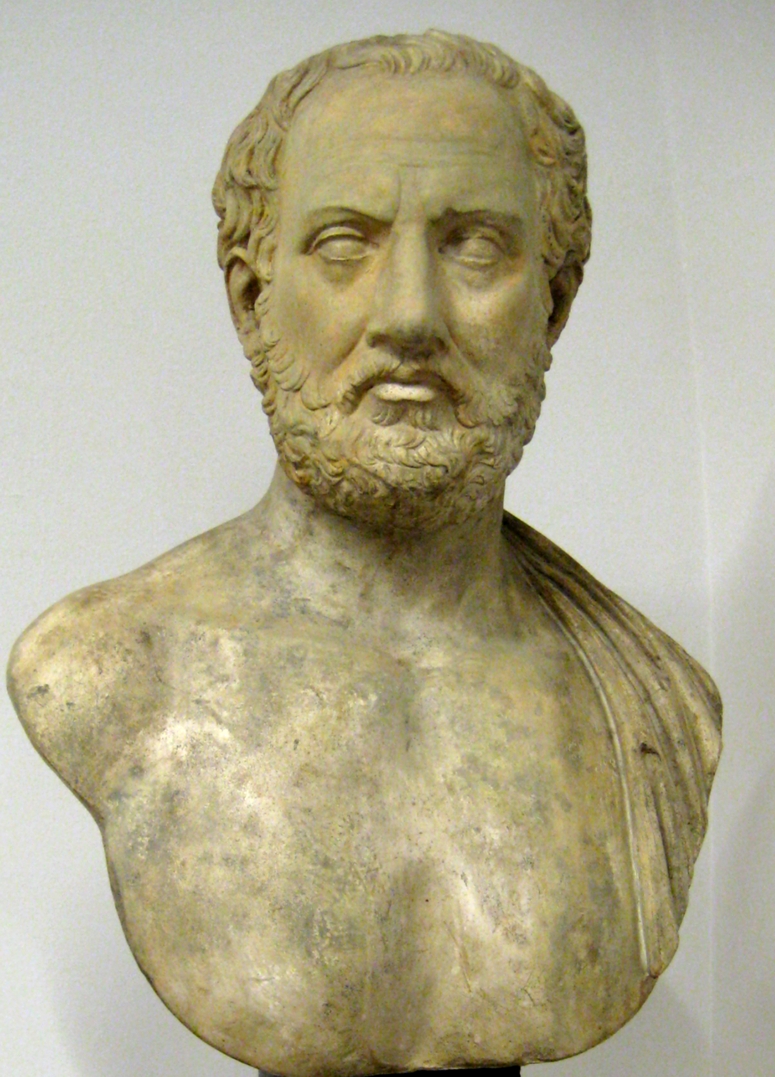Thúkýdidés nejznámější citáty
Zdroj: [Messner, Reinhold, Reinhold Messner, Cerro Torre: Tragédie na skalní jehle, Brána, Praha, 2009, 1, 253, Jaroslav Voříšek, 222, 978-80-7243-415-2]
„Totožnost zájmu je nejjistější pouto mezi státy nebo jednotlivci.“
Zdroj: BURCHILL, S. (2005): The National Interest in International Relations Theory, New York: Palgrave Macmillan, s. 15
Thúkýdidés: Citáty anglicky
Book I, 1.144-[3]
Variant translation: We must realize, too, that, both for cities and for individuals, it is from the greatest dangers that the greatest glory is to be won.
As translated by Rex Warner (1954).
History of the Peloponnesian War, Book I
Book I, 1.42-[3]
History of the Peloponnesian War, Book I
Book VIII, 8.96-[5]
History of the Peloponnesian War, Book VIII
Book II, 2.64-[5]
History of the Peloponnesian War, Book II
Book V, 5.111-[4]
History of the Peloponnesian War, Book V
Book VI, 6.18-[2]
History of the Peloponnesian War, Book VI
“war is a matter not so much of arms as of money”
Book I, 1.83-[2]
History of the Peloponnesian War, Book I
Book IV, 4.92-[7]
History of the Peloponnesian War, Book IV
Book VII, 7.66-[3]
History of the Peloponnesian War, Book VII
Book III, 3.82-[4]
History of the Peloponnesian War, Book III
Book VII, 7.44-[1]
History of the Peloponnesian War, Book VII
“Now the only sure basis of an alliance is for each party to be equally afraid of the other;”
Book III, 3.11-[2]
History of the Peloponnesian War, Book III
“They stood where they stood by the power of the sword.”
Book IV, 4.98-[7]
History of the Peloponnesian War, Book IV
Book I, 1.8-[3]
History of the Peloponnesian War, Book I
Book VII, 7.68-[3]
History of the Peloponnesian War, Book VII
Book VII, 7.28-[3]
History of the Peloponnesian War, Book VII
Book V, 5.103-[1]
History of the Peloponnesian War, Book V
Book I, 1.23-[6].
History of the Peloponnesian War, Book I
Variant translation: "People always think the greatest war is the one they are fighting at the moment, and when that is over they are more impressed with wars of antiquity; but, even so, this war will prove, to all who look at the facts, that it was greater than the others." Translation by Paul Woodruff.
Book I, 21-[2]
History of the Peloponnesian War, Book I
Book III, 3.22-[7]-[8] (See also: Spoofing attack..).
History of the Peloponnesian War, Book III
“self-control contains honour as a chief constituent, and honour bravery.”
Book I, 1.84; "self-control is the chief element in self-respect, and respect of self, in turn, is the chief element in courage" ( trans. Charles Forster Smith https://archive.org/stream/thucydideswithen01thucuoft/thucydideswithen01thucuoft#page/142/mode/2up)
History of the Peloponnesian War, Book I
“he who voluntarily confronts tremendous odds must have very great internal resources to draw upon.”
Book II, 2.89-[6].
History of the Peloponnesian War, Book II
Book VII, 7.12-[3]-[4]
History of the Peloponnesian War, Book VII
Book II, 2.62-[4]-[5]
History of the Peloponnesian War, Book II
Variant translation: "Instead, we think the plans of our neighbors are as good as our own, and we can't work out whose chances at war are better in a speech. So we always make our preparations in action, on the assumption that our enemies know what they are doing. We should not build our hopes on the belief that they will make mistakes, but on our own careful foresight. And we should not think there is much difference between one man and another, except that the winner will be the one whose education was the most severe." Translation by Paul Woodruff.
Variant translation: "There is no need to suppose that human beings differ very much from one another: but it is true that the ones who come out on top are the ones who have been trained in the hardest school." Note: Some versions omit the "who have been".
Book I, 1.84-[4]
History of the Peloponnesian War, Book I
Book IV, 4.62-[3]-[4]
History of the Peloponnesian War, Book IV
“The secret of happiness is freedom and the secret of freedom is courage.”
Book II, 2.43
History of the Peloponnesian War, Book II
Book I, 1.22-[4]
History of the Peloponnesian War, Book I
Book IV, 4.59-[2]; "Nobody is driven into war by ignorance, and no one who thinks that he will gain anything from it is deterred by fear." ( trans. http://www.classicpersuasion.org/pw/thucydides/thucydides-passages.php?pleaseget=4.59-64 Benjamin Jowett)
History of the Peloponnesian War, Book IV
